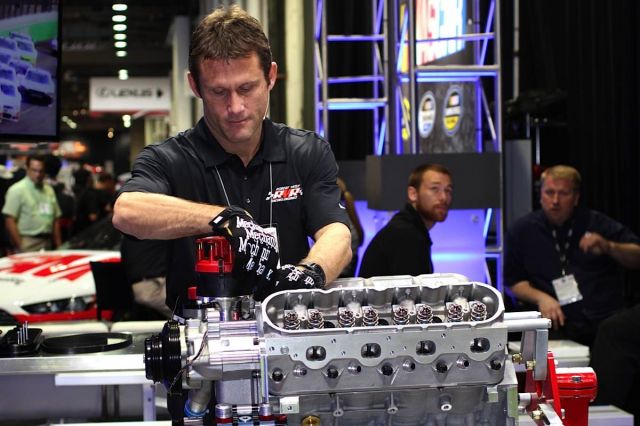Controversy over the NASCAR-approved spec engines for sportsman classes is unlikely to fade away; however, the technology and development behind the engine is worthy of a review as teams prepare for the 2013 season.
The LS2-based 364ci V8 is allowed as an alternative to purpose-built or “open” race engines for the NASCAR K&N Pro Series, Canadian Tire Series and Whelen Modified Tours. The spec engine is not a fully assembled, sealed crate motor — a practice that is promoted in other grassroots racing divisions. Under this program, approved parts are encrypted and sold through Robert Yates Racing Engines. Customers can have the engine parts assembled and dyno tested by RYRE or an engine builder of their choice. However, none of the components can be modified before assembly. For 2013, prices for the kit vary between the different series, ranging from $21,000 up to $24,500. Assembly and dyno time at RYR adds another $4,000. Other shops may charge more or less for assembly, tuning and fully dressing the engine with accessories, such as alternator and power-steering pump.
Controlling the cost of racing is the motivation behind the spec engine program. NASCAR officials noticed car counts in many of the its home-track series going down as early as 2006. Officials asked Carl Wegner to develop a cost-effective alternative that was reliable and capable of delivering 600-plus horsepower. RYRE took over the program in January 2011.
“Engine development was pretty much done, but we tweaked and added a few things that have helped with reliability,” says Chris Davy, general manager and co-founder of RYRE with legendary engine builder Robert Yates.
Established engine development is one of the selling points, according to NASCAR officials. With the spec engine kit, all of the development is included in the cost. Engine builders have the potential to make more profit for the time spent by focusing only on assembly than spreading out the development and parts acquisition over a longer time frame.
“We are not in competition with the engine builder,” stresses Bob Duval, director of the weekly and touring business development at NASCAR.
“We want engine builders to be involved in this,” adds Davy. “Racers don’t have to buy the assembled engine from us.”
LS2 foundation
The engine package starts with a factory GM LS2 block (4-inch bore). Internals include a 3.622-inch stroke Lunati crankshaft, Lunati rods, JE pistons (10.5:1 compression ratio), Cometic gaskets and Clevite bearings. The bottom side finishes up with a Champ oil pan, Stock Car Products oil pump, ATI damper and QuarterMaster flywheel and starter.
“We’ll get the LS2 heads from the production line to keep costs down,” says Davy. “We’ll do the CNC porting and make sure there is a 64cc chamber.”
Topping off the spec engine are a Comp Cams camshaft, Edelbrock manifold, Holley carburetor and MSD distributor.
In K&N Pro Series trim, the engine is rated at 610 horsepower with 500 lb-ft peak torque. The Canadian Tire series requires a smaller carb and tapered spacer, so horsepower is choked back to 500.
Before the parts are collected for an engine kit, they are certified by RYRE and then encrypted with sophisticated square-dot code pattern.
Rods, camshafts, rockers and even lifters all get security encryption.
RYRE uploads all the encryption data to NASCAR on a daily basis, including the RYRE part number, a sequential numbering system and time-and-date stamp.
“That information is then sent to tech inspectors who use hand-held scanning tools that can tell them if the parts came from us,” says Davy. “It’s pretty hard to cheat this engine.”
There’s isn’t much flexibility for the engine builder, other than playing with the ring gaps or clearances and changing carb jets.
“We run the mains around .0022 or .0023 but some like it tighter,” says Davy. “And we recommend 29 degrees on the timing.”
According to Davy, the spec engine is used by about 60 to 70% of racers in the K&N Pro Series and Canadian Tire Series, but engine is less received on the Whelen Modified tracks. All totaled, more than 350 spec engines were used in 2012 in all the series, producing a combined 36 victories and 207 top-5 finishes.
Adoption rate
“It’s been legal [in the Whelen series] for a number of years but really hasn’t found the adoption rate,” says Davy. “A lot of racers have inventory tied up in the built engines.”
We are not in competition with the engine builder.
— Bob Duval
The controversy over spec engine, of course, stems from concerns that it isn’t as durable as an open motor or that racers using the spec engine will be given preference in some manner. The worst fear is that the spec engine will be mandated.
“NASCAR is trying hard to make it an option and make it competitive with the open engines,” explains Davy, “but let it sell on its own merits.”
As for durability, Davy says the average duration cycle is 800 to 1,000 miles before a refresh is recommended. But there is one customer who logged 2,000 miles before a rebuild.
“He was a crew chief with Nationwide experience,” adds Davy, “so he knew how to warm it up and when to change valve springs.”


























